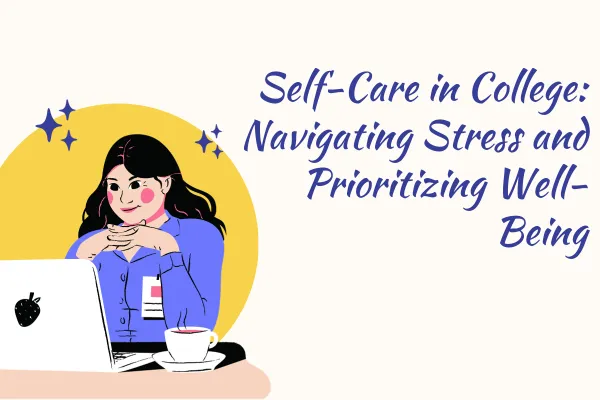Self-Care in College: Navigating Stress and Priotizing Well-Being
College life, with its whirlwind of classes, assignments, and social engagements, can be exhilarating but also overwhelming. It's crucial to recognize the importance of self-care in this demanding environment, where stress and pressure are prevalent. Read on and we'll explore why self-care matters in college and provide practical tips, mindfulness exercises, and stress management strategies to help students prioritize their mental and physical well-being.
The Importance of Self-Care in College:
1. Maintaining Balance:
College is a delicate balancing act between academics, social life, and personal growth. Without proper self-care, this balance can be disrupted, leading to burnout and diminished well-being.
2. Enhancing Productivity:
Taking time for self-care is not a luxury but a necessity for productivity. When your mind and body are well-nourished and rested, you're better equipped to handle academic challenges and make the most of your college experience.
3. Building Resilience:
Self-care fosters resilience, helping you navigate setbacks and challenges more effectively. By prioritizing your well-being, you build the mental and emotional strength needed to overcome obstacles.
Practical Self-Care Tips:
1. Establish a Routine:
Create a daily routine that incorporates time for classes, studying, and self-care. Consistency in your schedule provides structure and helps reduce feelings of chaos and overwhelm.
2. Prioritize Sleep:
Ensure you get enough restful sleep each night. Lack of sleep can impact your mood, cognitive function, and overall well-being. Establish a bedtime routine to signal your body that it's time to wind down.
3. Healthy Nutrition:
Fuel your body with nutritious food. A balanced diet supports physical health and contributes to better mental clarity. Keep hydrated and incorporate fruits, vegetables, and whole grains into your meals.
4. Exercise Regularly:
Physical activity is a powerful stress reliever. Find an exercise routine that you enjoy, whether it's jogging, yoga, or dancing. Regular movement not only benefits your body but also boosts your mood and reduces stress.
5. Digital Detox:
Take breaks from screens to avoid digital fatigue. Set designated times to check emails and social media. Disconnecting for a while can refresh your mind and improve overall well-being.
Mindfulness Exercises:
1. Deep Breathing:
Practice deep breathing exercises to calm the nervous system. Inhale deeply through your nose, hold for a few seconds, and exhale slowly through your mouth. Repeat several times.
2. Mindful Walking:
Take short breaks for mindful walks. Focus on your breath and the sensations of each step. This simple exercise can bring clarity and reduce stress.
3. Body Scan Meditation:
Dedicate a few minutes to a body scan meditation. Close your eyes and mentally scan each part of your body, releasing tension and promoting relaxation.
Stress Management Strategies:
1. Time Management:
Efficiently manage your time by prioritizing tasks and breaking them into smaller, manageable steps. This helps prevent last-minute cramming and reduces stress.
2. Set Realistic Goals:
Establish achievable goals for yourself. Break down larger tasks into smaller ones, and celebrate your accomplishments along the way. This approach fosters a sense of achievement and motivation.
3. Seek Support:
Don't hesitate to seek support from friends, family, or campus resources. Sharing your feelings and concerns can provide perspective and emotional relief.
Self-care is not a luxury but a fundamental aspect of a successful and fulfilling college experience. By incorporating these practical tips, mindfulness exercises, and stress management strategies into your routine, you can navigate the challenges of college life while prioritizing your mental and physical well-being. Remember, a well-cared-for self is better equipped to handle the demands of academic and personal growth. Here's to a balanced and thriving college journey!

